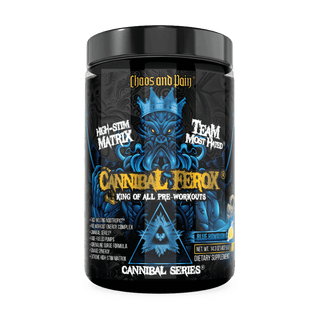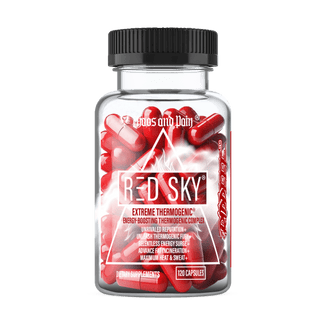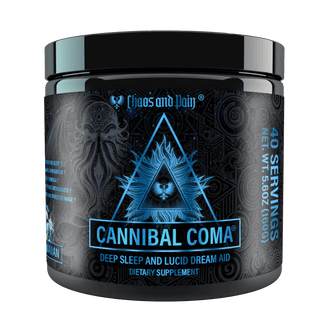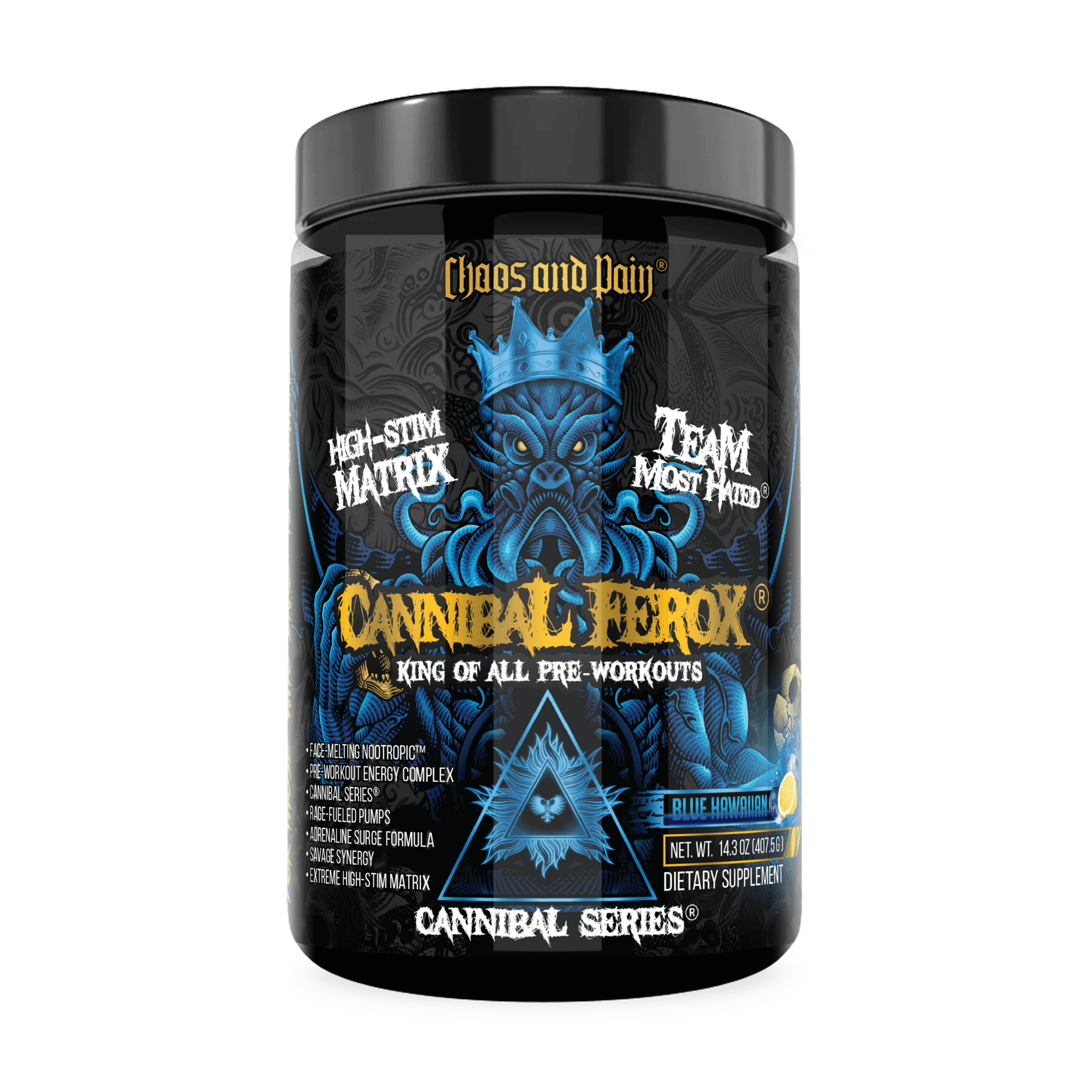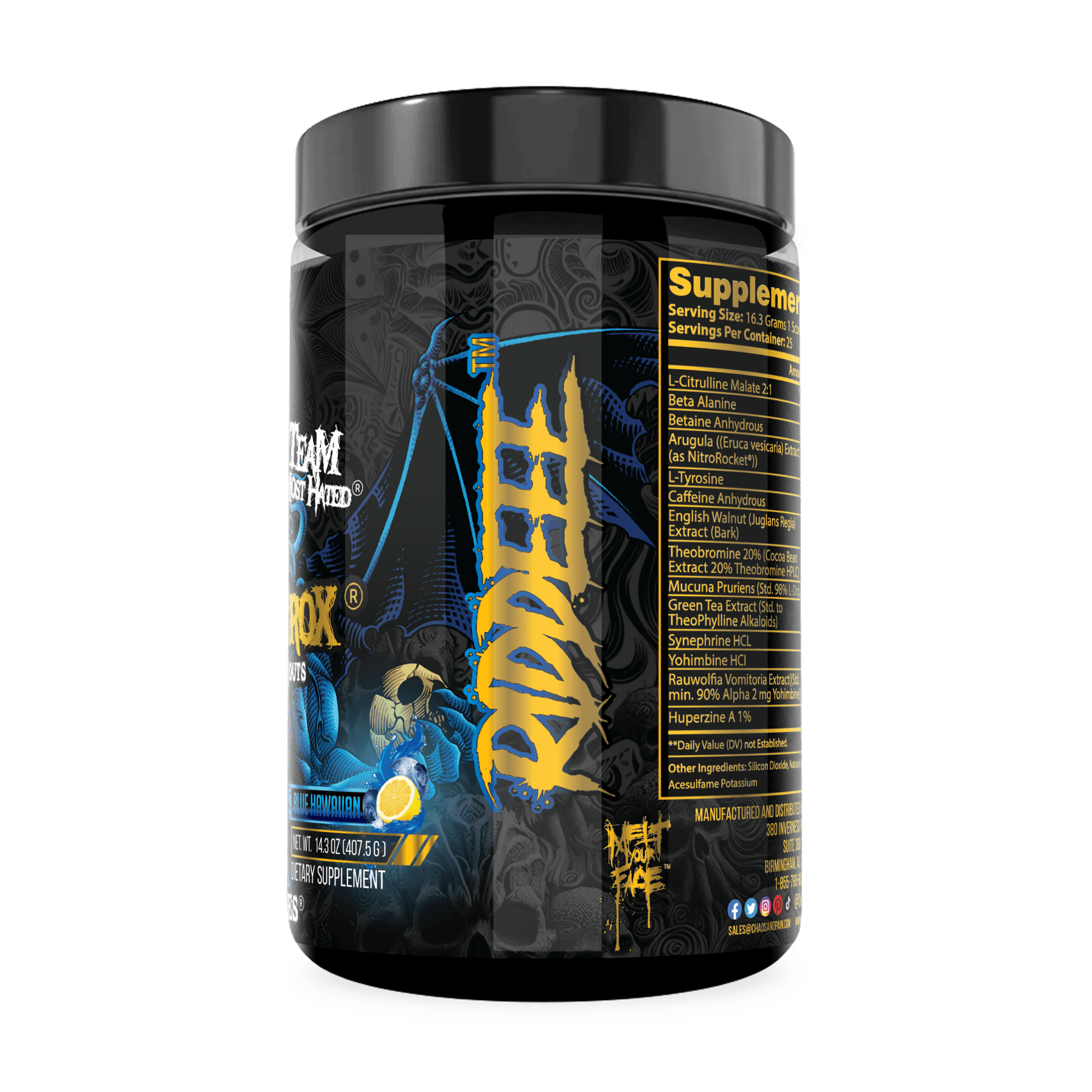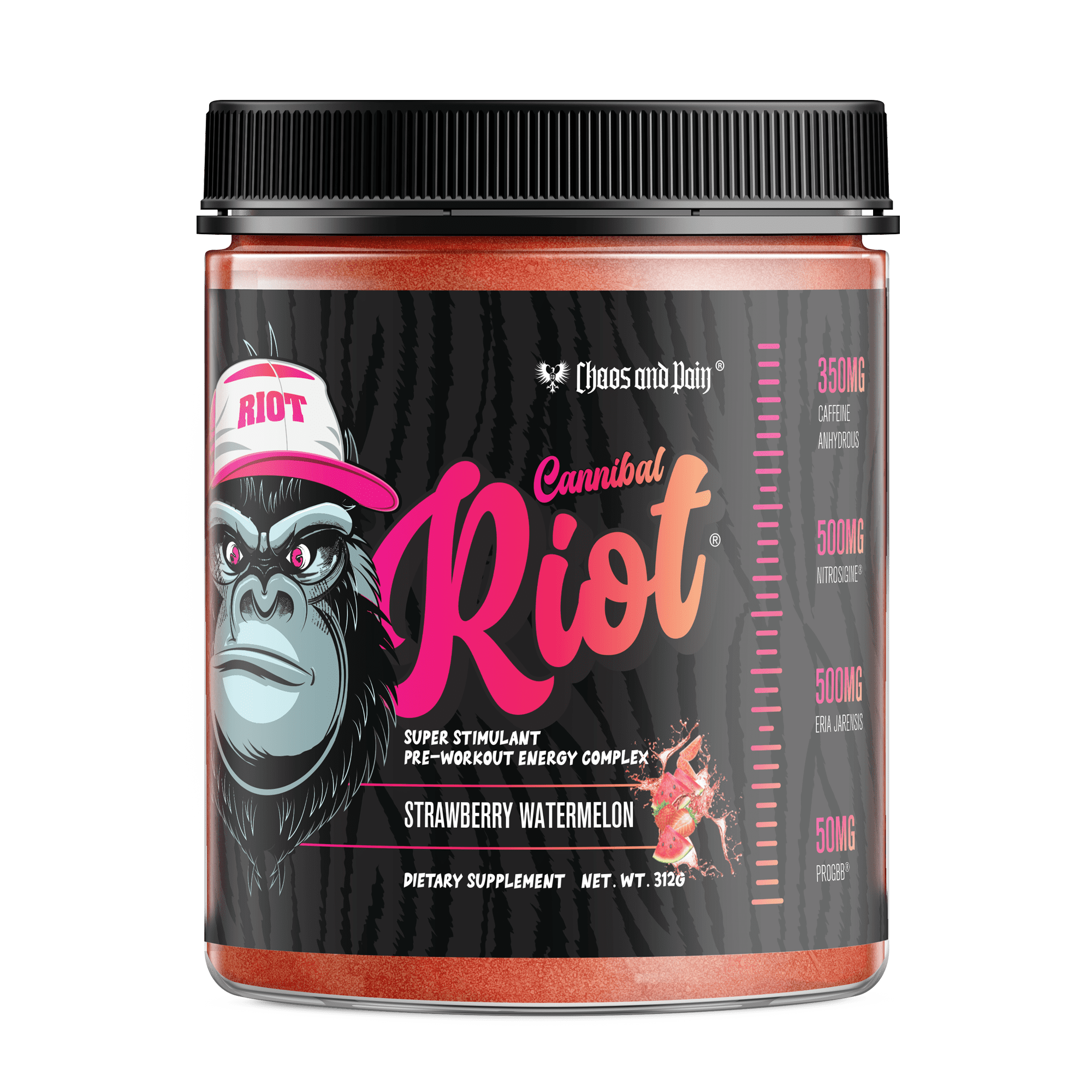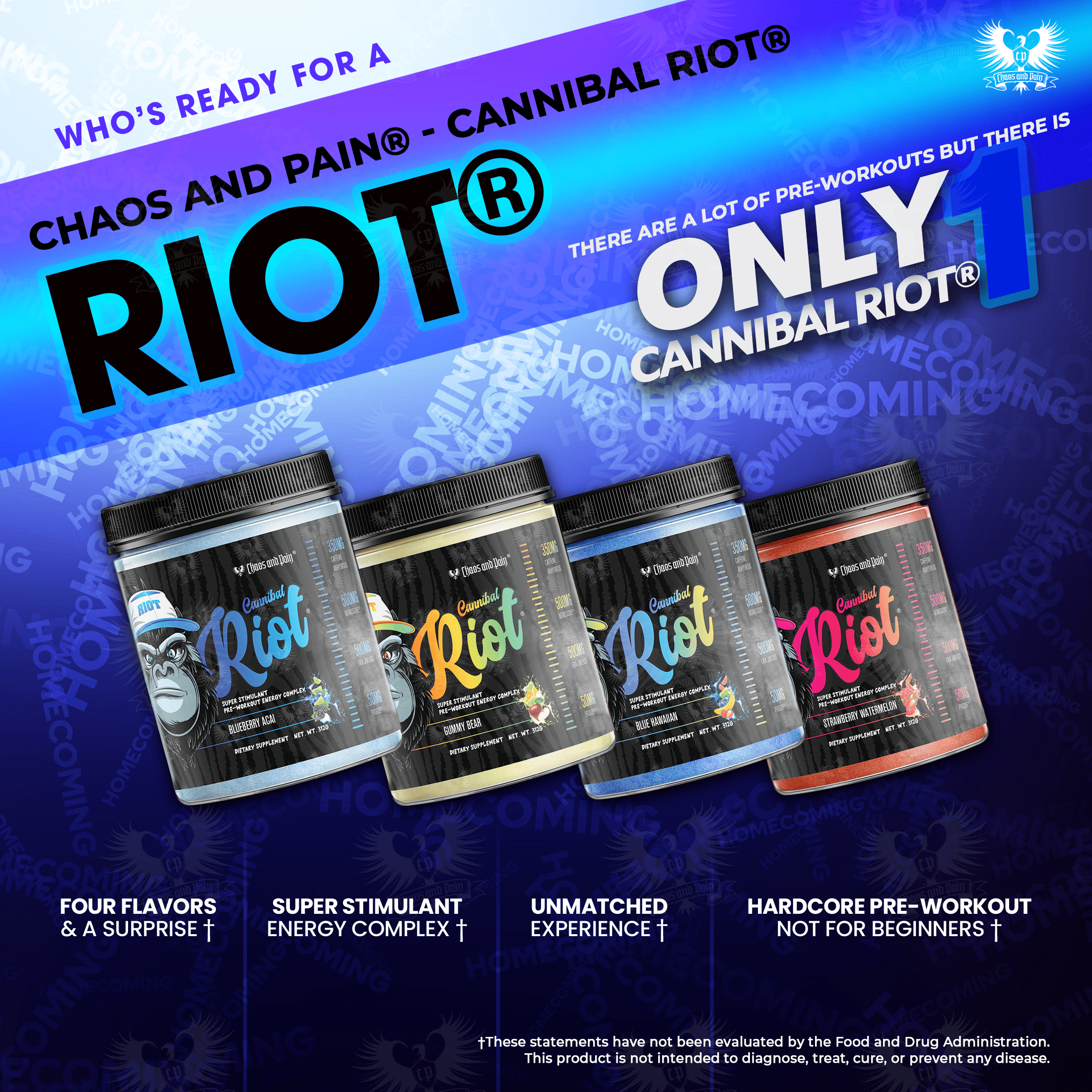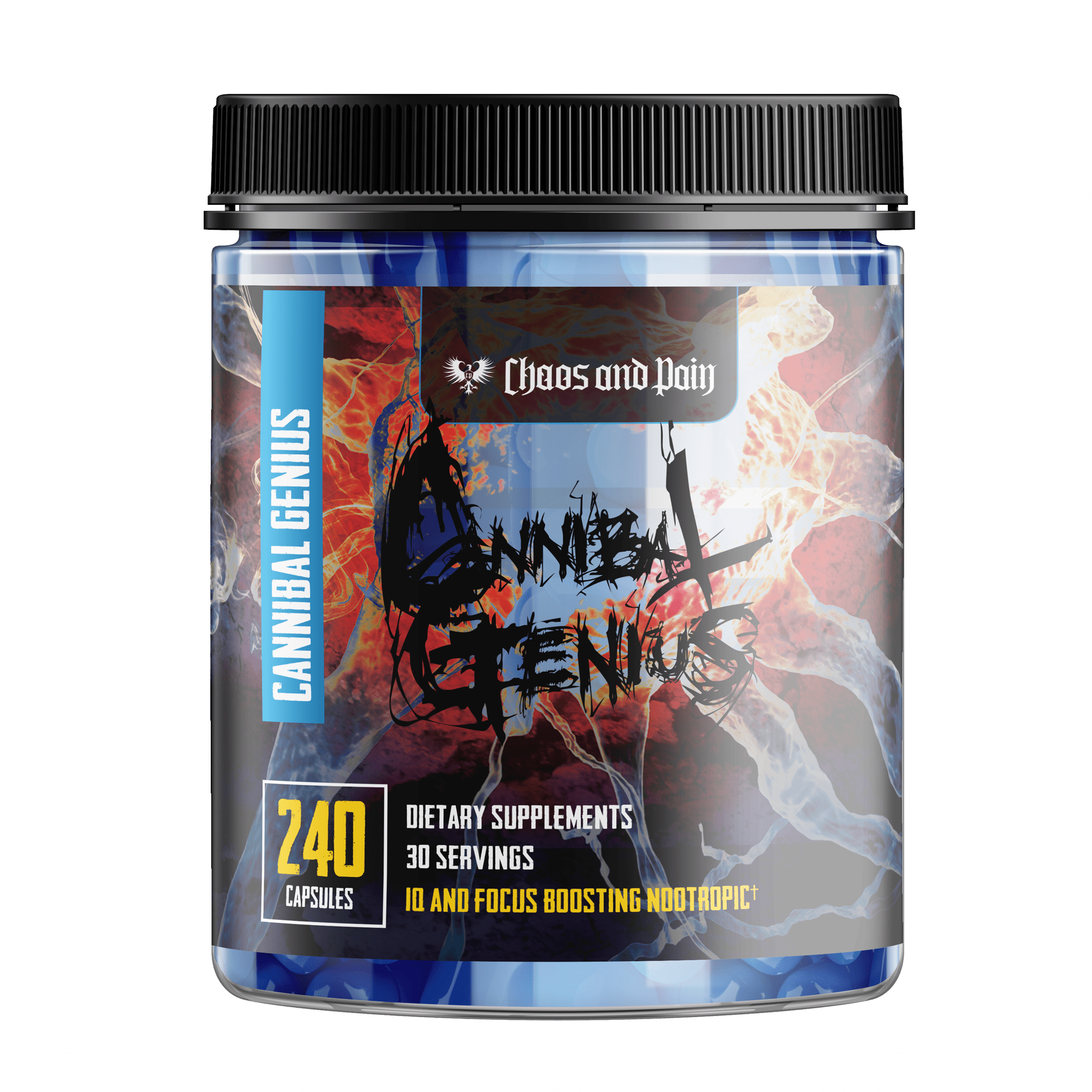Cannibal Kraken - Whey Protein Blend
Whey protein is generally considered the best of all of the powdered proteins one could eat, no matter if it is isolate or concentrate. Both have their own unique qualities, but no matter which you are consuming, you get the following benefits from supplementation with a combination of isolate and concentrate:
- improved athletic performance†
- Improved mood†
- reduced stress†
- fat loss†
- decreased waist circumference †
- reduced cancer rates†
- lower incidence and severity of HIV symptoms†
- improved immunity†
- lowered cortisol†
- improved liver function in those suffering from certain forms of hepatitis†
- reduced blood pressure†
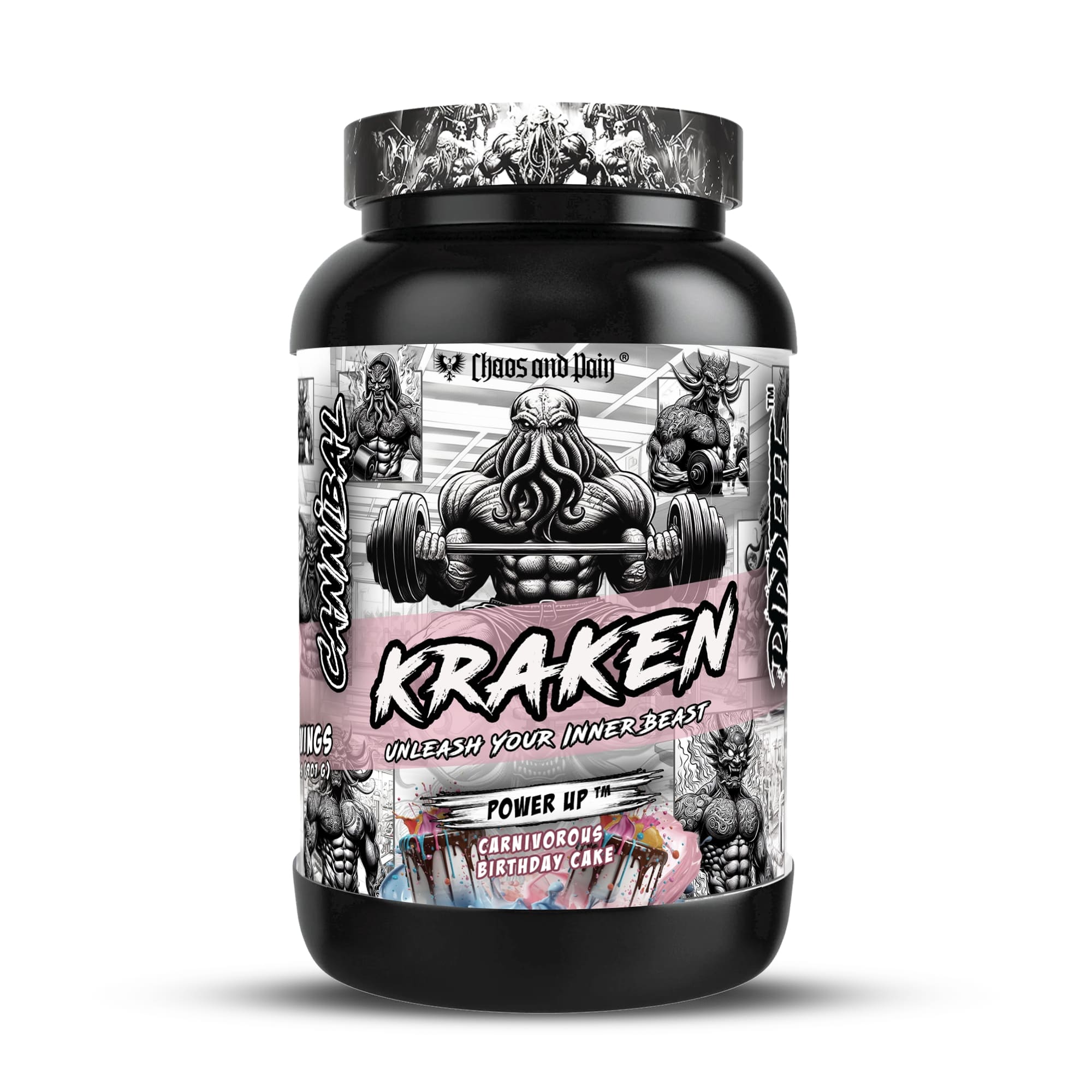
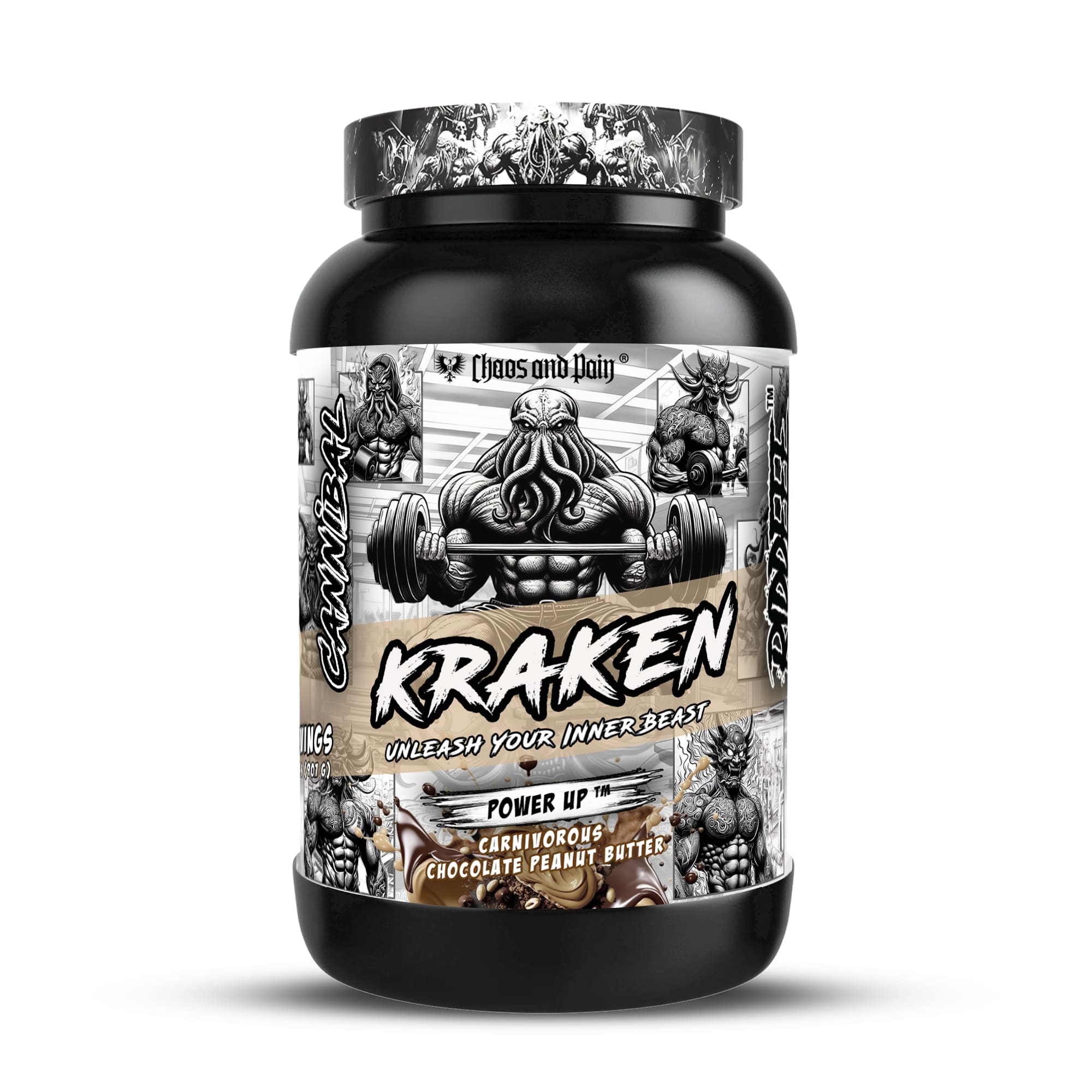
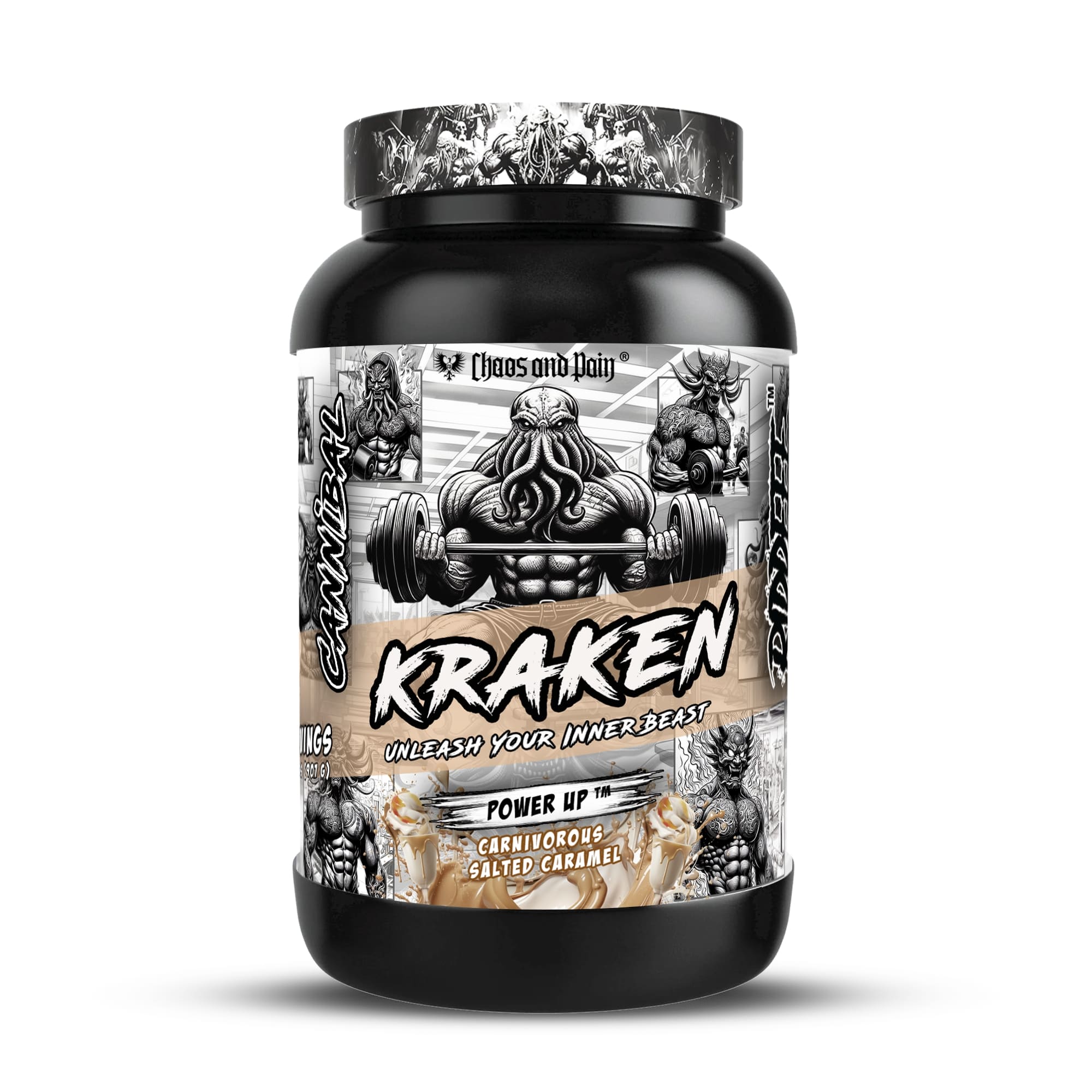
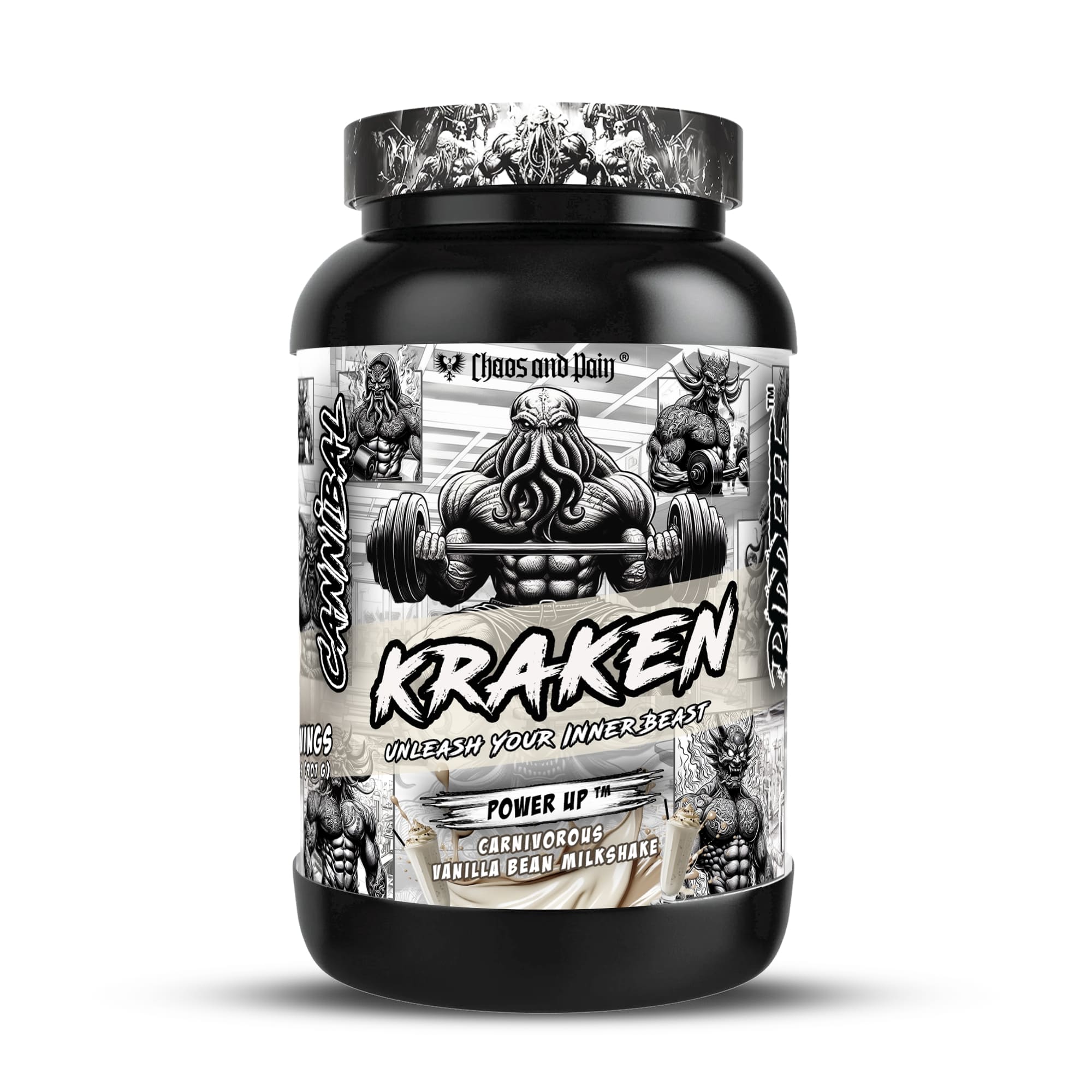
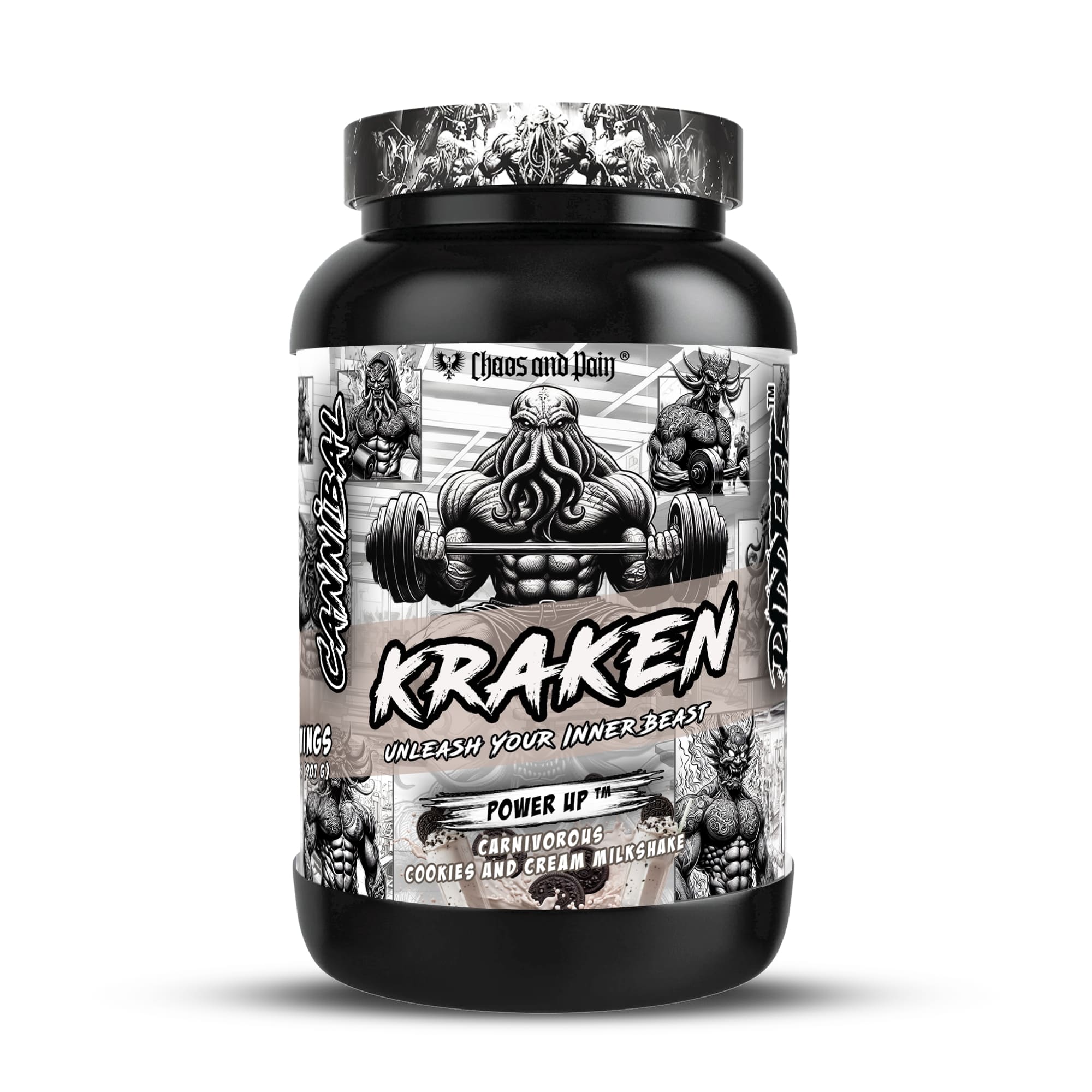
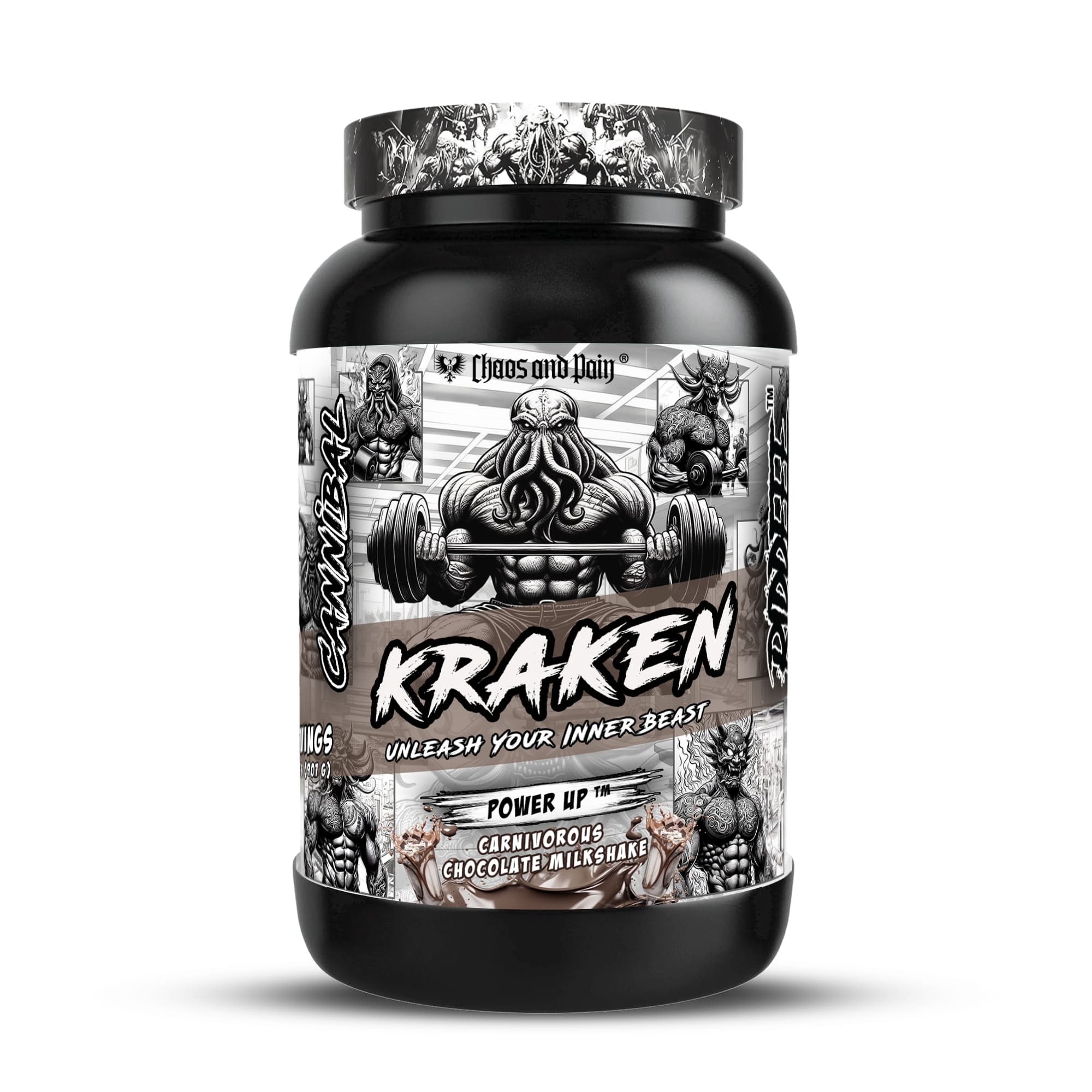
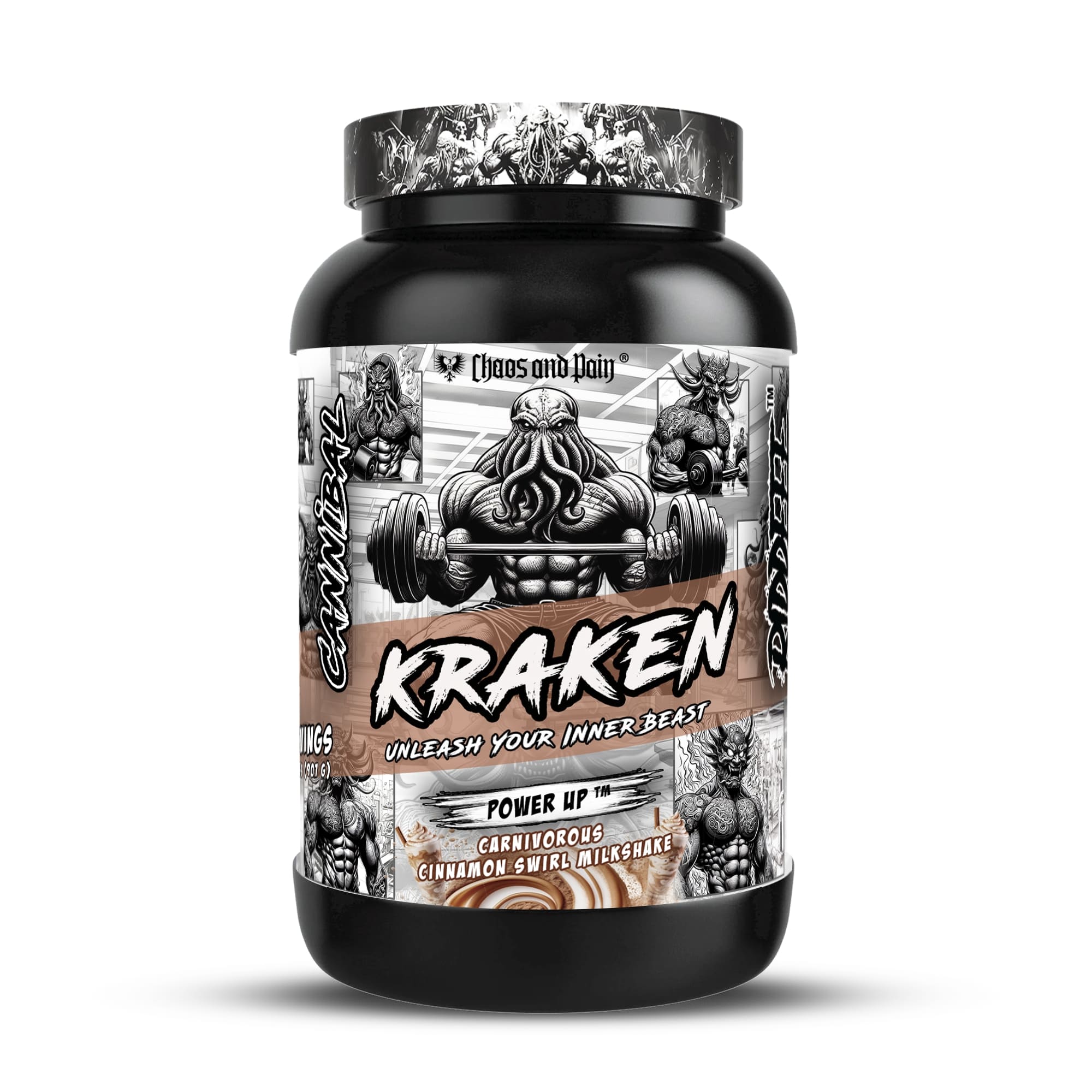
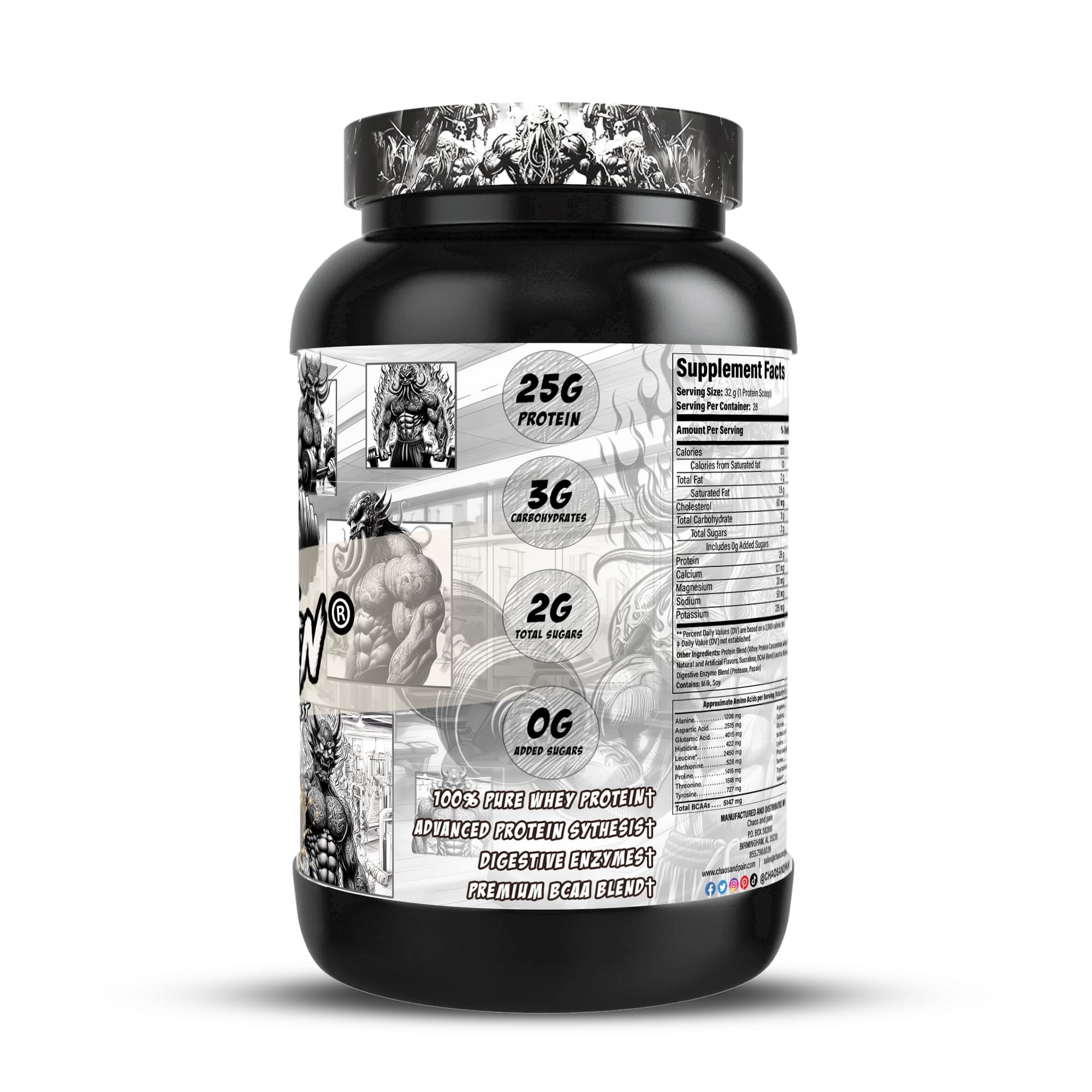
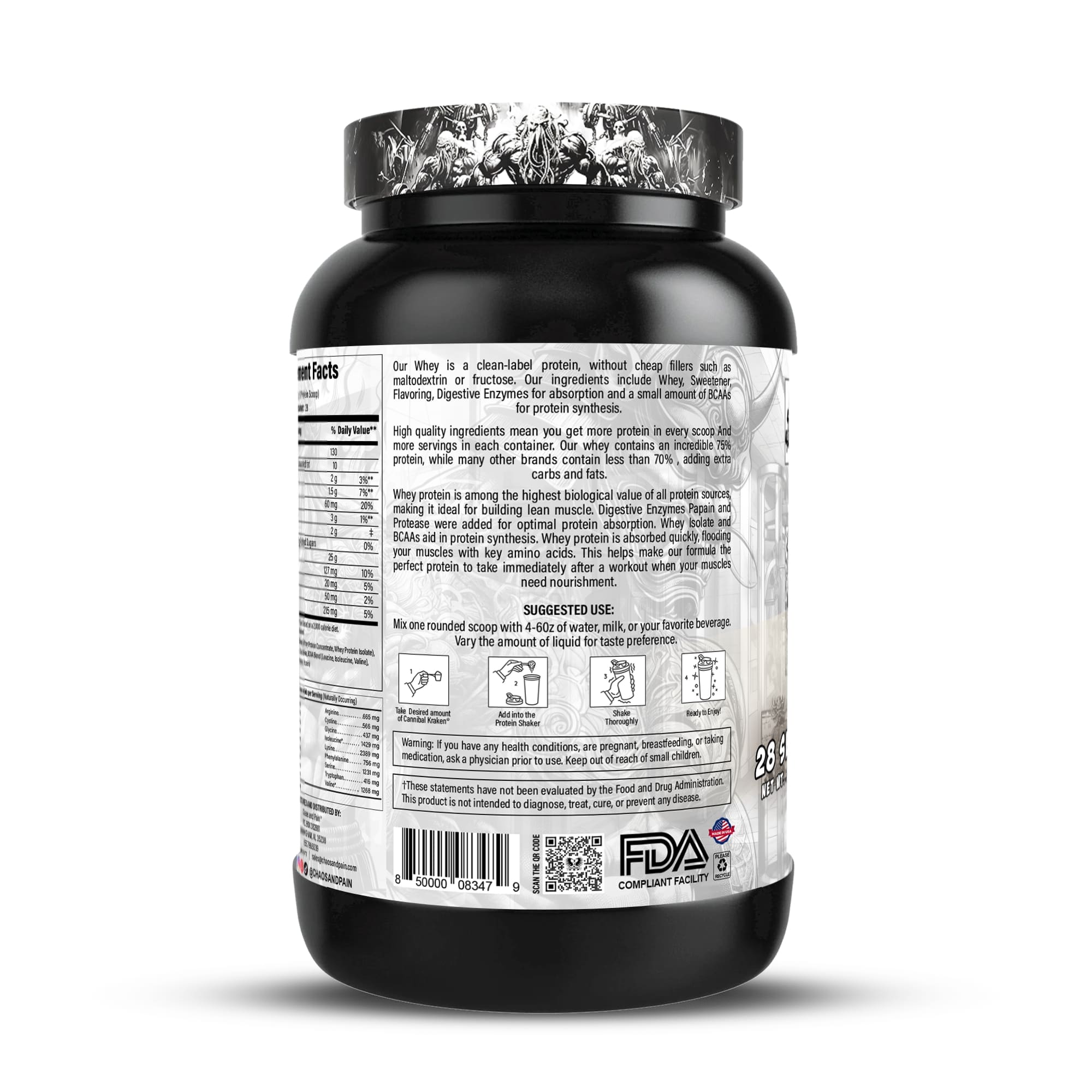
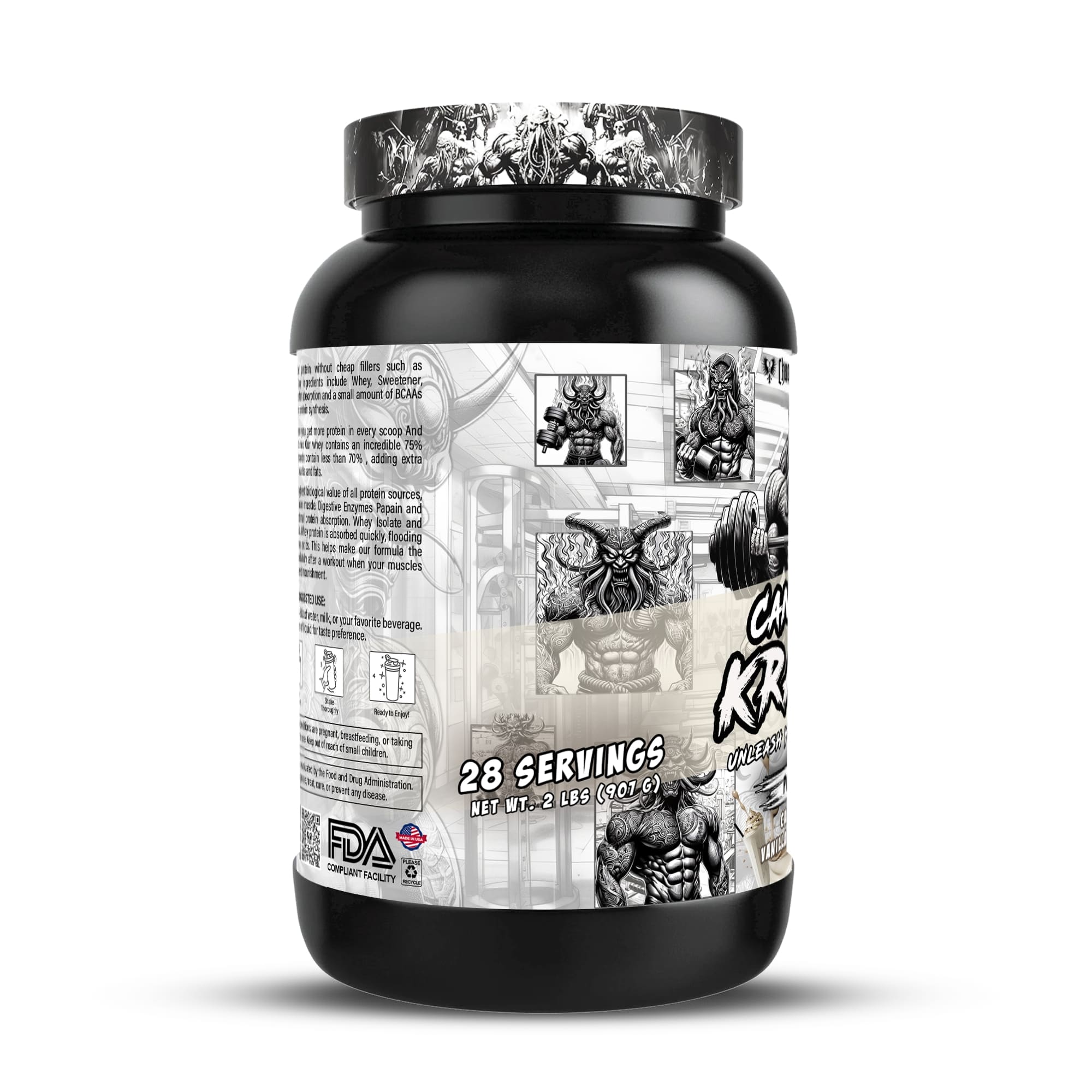
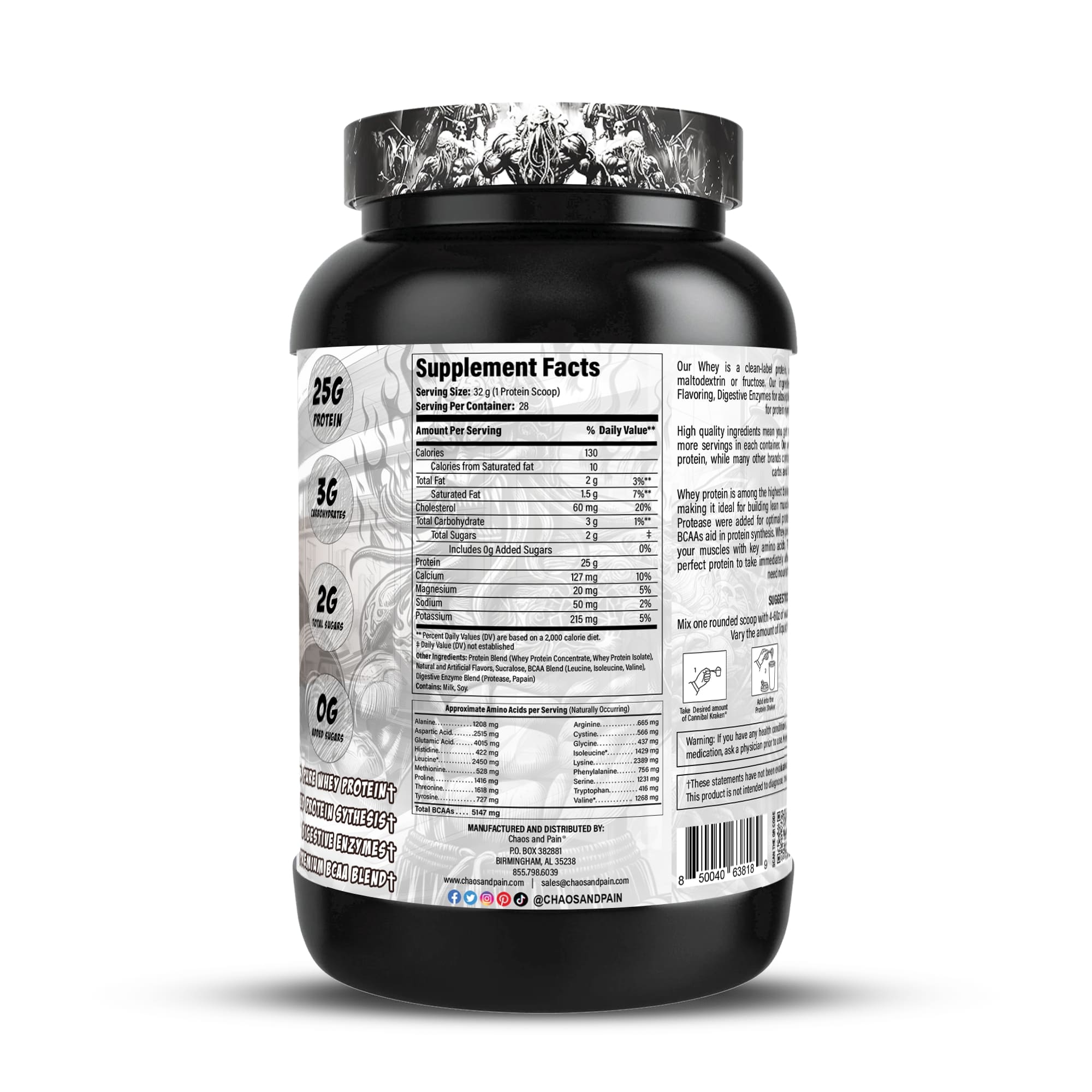
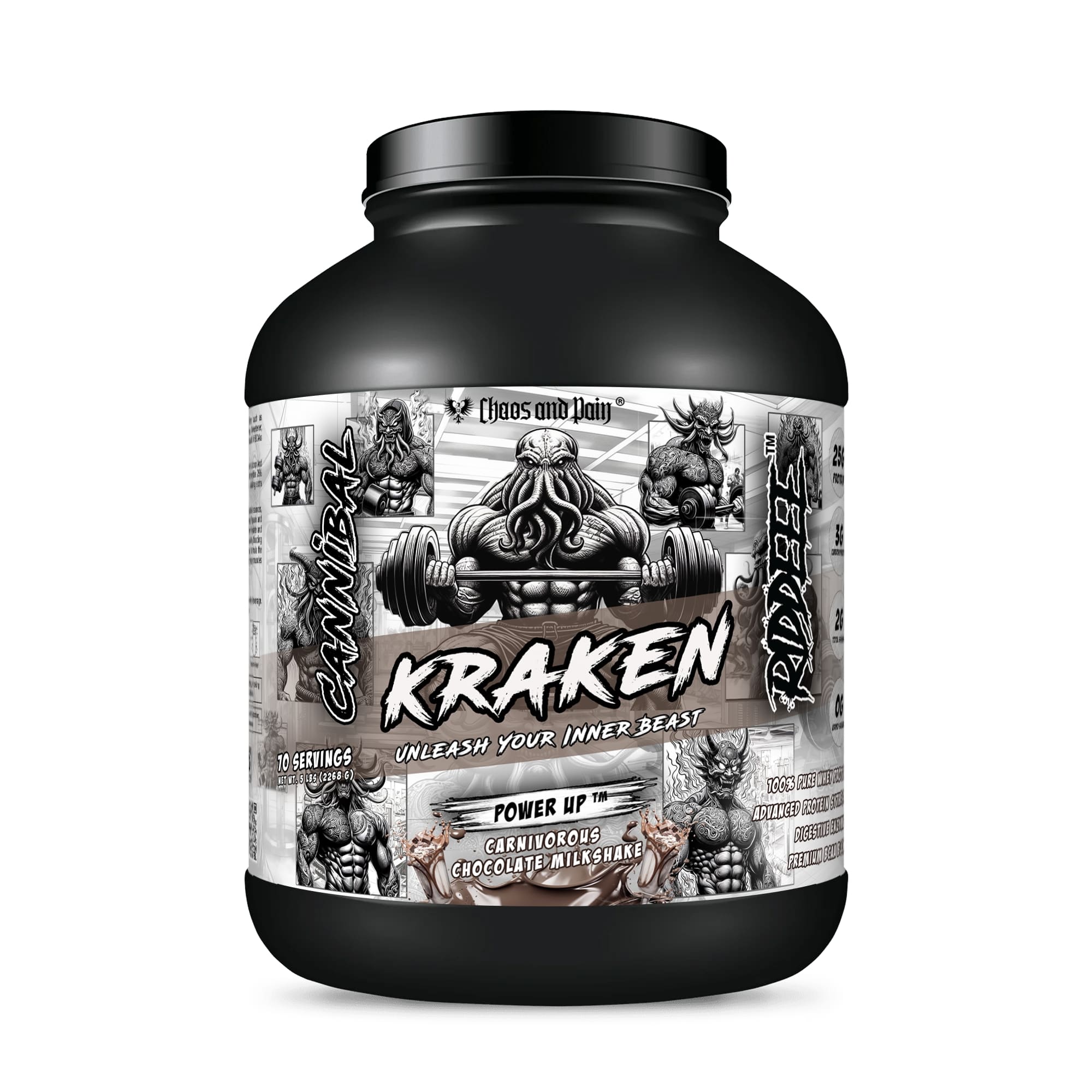
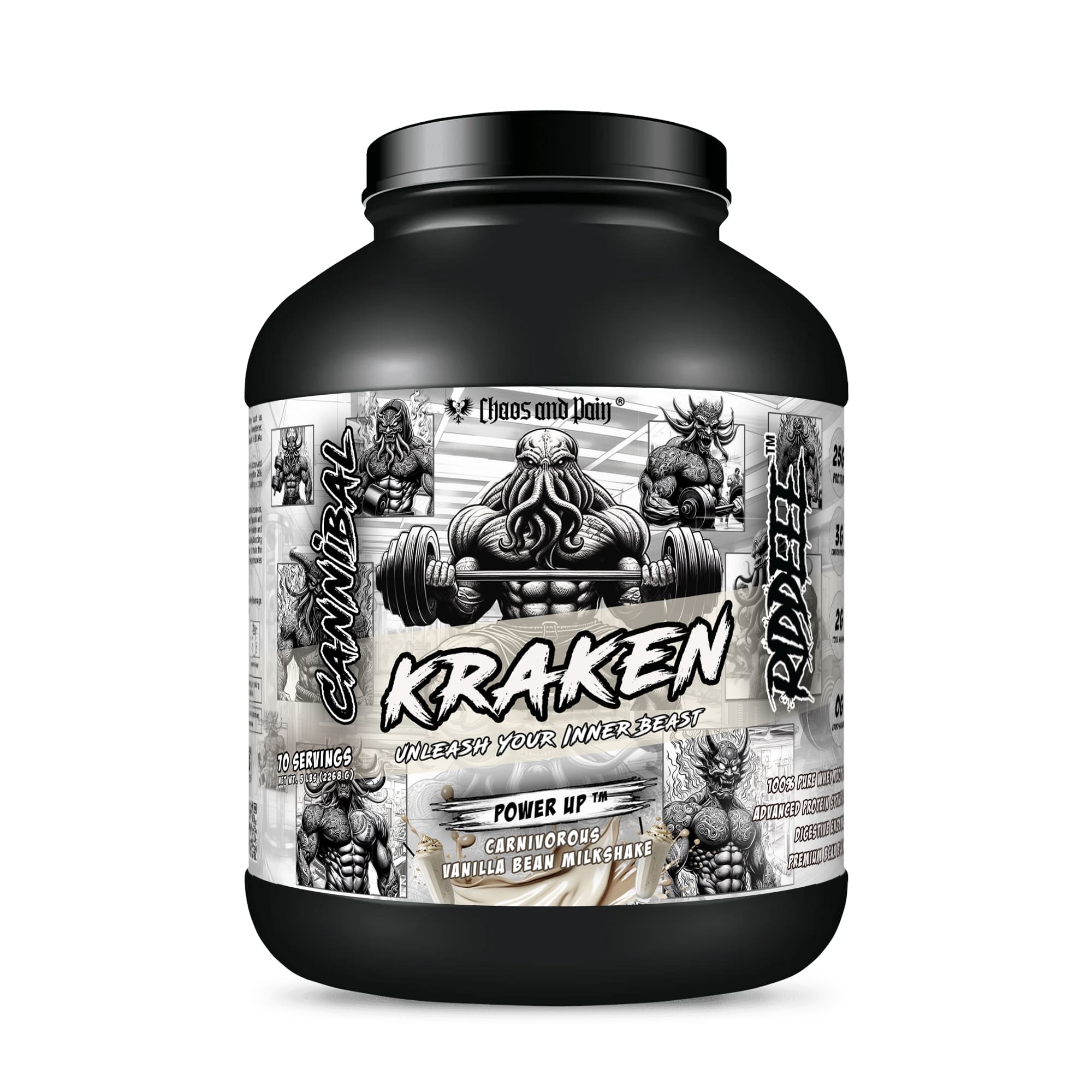
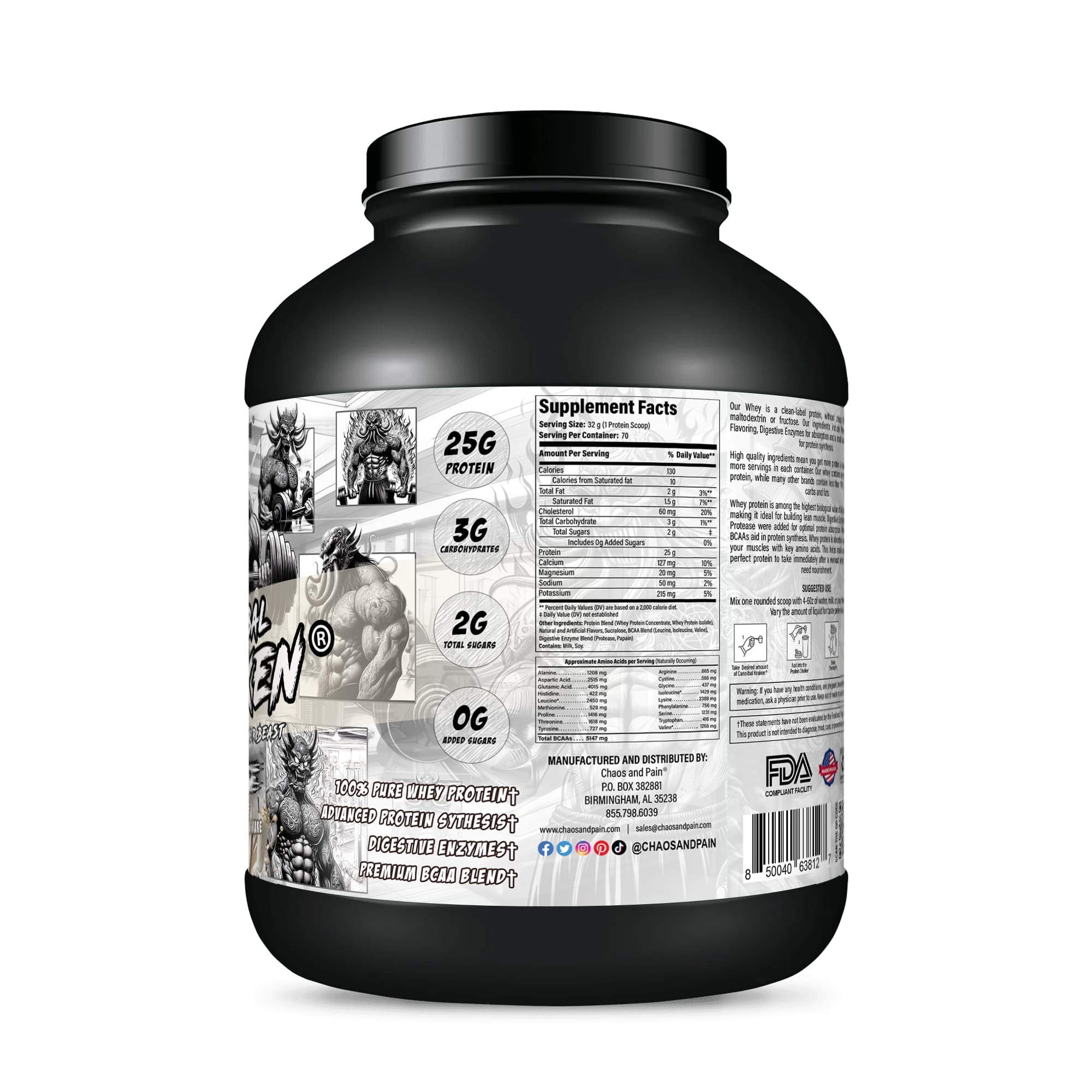



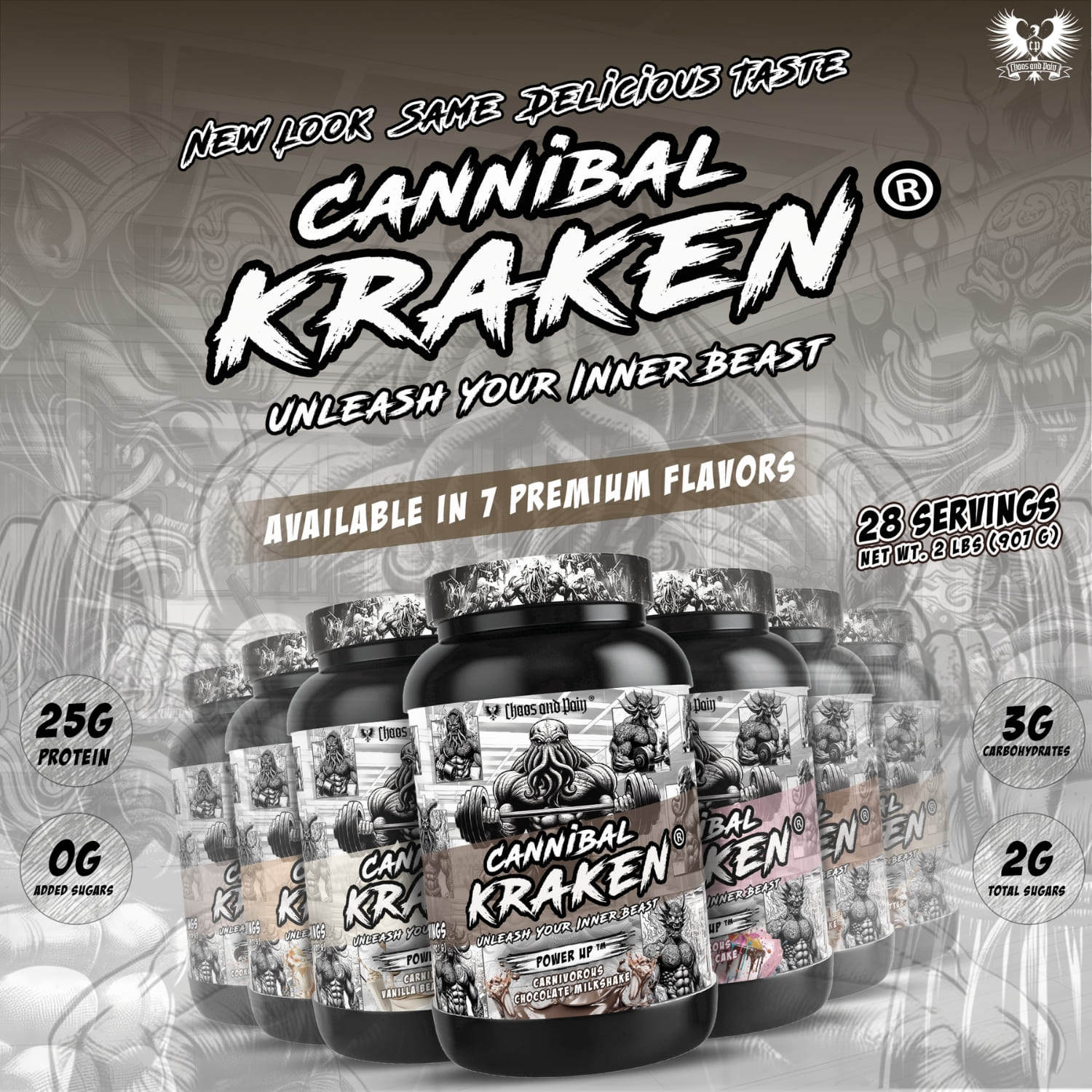
Quick Cannibal Kraken Facts
CANNIBAL KRAKEN® Whey isolate is lower in fat and carbohydrate and higher in protein than concentrate. This leads to a far cleaner nutrient profile and the impression that it’s superior to concentrate, but whey concentrate is jammed with a variety of awesome things isolate lacks. For instance, whey concentrate contains much higher levels of IGF-1, TGF-1, and TGF-2. All of which aid aid in the following:
- hypertrophy and strength
- more conjugated linoleic acid (CLA)
- immunoglobulins
- and lactoferrin, leading to faster body recomposition.
Low in fat and carbohydrates but jammed with 24 grams of the highest quality whey protein, Cannibal Kraken provides instantized awesome in a variety of delicious flavors.
FAQ
What is Whey Protein?
Whey protein is a type of protein that is derived from milk. It is a byproduct of the cheese-making process, in which the liquid remaining after the curds are removed is called whey. Whey protein is a complete protein, meaning it contains all of the essential amino acids needed by the human body, and it is also one of the richest sources of branched-chain amino acids (BCAAs), which are important for muscle growth and recovery. +
There are several different forms of whey protein, including:
- Whey protein concentrate (WPC): This is the most common form of whey protein and contains a protein content of 70-80%. It also contains small amounts of fat, lactose, and other impurities. +
- Whey protein isolate (WPI): This is a purer form of whey protein that has had most of the fat, lactose, and other impurities removed, leaving a protein content of 90% or higher. +
- Hydrolyzed whey protein: This form of whey protein has been partially broken down into smaller peptides, making it easier for the body to absorb and utilize. +
Whey protein is commonly used as a dietary supplement, particularly by athletes, bodybuilders, and others who want to increase their protein intake and support muscle growth and recovery. It can also be used as a meal replacement or added to smoothies and other foods as a way to boost protein intake. +
Is Whey Protein good for you?
Whey protein is generally considered to be a healthy dietary supplement when consumed in appropriate amounts as part of a balanced diet. +
Whey protein is a complete protein, which means it contains all of the essential amino acids needed by the human body. Additionally, it is rich in branched-chain amino acids (BCAAs), which are important for muscle growth and recovery. As a result, whey protein is often used by athletes, bodybuilders, and others who want to increase their protein intake and support muscle growth and recovery. +
Whey protein is also a good source of other nutrients such as calcium and other minerals, which are important for bone health. +
However, it's important to note that not all whey protein supplements are created equal. Some products may contain added sugars, artificial sweeteners, or other ingredients that may not be beneficial for health. It's important to read the label and choose a product that is made with high-quality ingredients, and avoid added sugars. +
Additionally, people with lactose intolerance or milk allergies should avoid whey protein or choose a whey protein isolate which has most of the lactose removed. +
Overall, whey protein can be a beneficial addition to a healthy diet, but it should be consumed in appropriate amounts and in combination with a balanced diet and regular physical activity. +
What is Whey Protein made of?
Whey protein is a type of protein that is derived from milk. It is a byproduct of the cheese-making process, in which the liquid remaining after the curds are removed is called whey. +
The main component of whey protein is a group of proteins called globulins, which are composed of alpha-lactalbumin, beta-lactoglobulin, and bovine serum albumin. These proteins are rich in essential amino acids, particularly branched-chain amino acids (BCAAs) like leucine, isoleucine, and valine, which are important for muscle growth and recovery. +
Whey protein also contains small amounts of other nutrients such as calcium, phosphorus, and other minerals, which are important for bone health, and lactoglobulin, an immune-boosting protein. +
Whey protein supplements are made by extracting the proteins from the whey liquid, through a process called ultrafiltration, which separates the proteins from the other components such as lactose, minerals and fat. This can be further processed to create different forms of whey protein, like whey protein concentrate, whey protein isolate, and hydrolyzed whey protein. +
It's important to note that not all whey protein supplements are created equal. Some products may contain added sugars, artificial sweeteners, or other ingredients that may not be beneficial for health. It's important to read the label and choose a product that is made with high-quality ingredients, and avoid added sugars. +
Is Whey Protein bad for you?
Whey protein is generally considered to be safe and healthy when consumed in appropriate amounts as part of a balanced diet. However, some people may experience side effects or have certain health conditions that make it less suitable for them. +
For some people, consuming whey protein may cause digestive issues such as gas, bloating, or diarrhea, particularly if they have a lactose intolerance or milk allergy. People with these conditions should consider using whey protein isolate, which has most of the lactose removed. +
Some people may be allergic to one or more of the proteins found in whey, such as alpha-lactalbumin or beta-lactoglobulin. +
In addition, consuming high doses of whey protein supplements can lead to kidney damage in people who have pre-existing kidney problems or are at a high risk of developing them. +
It's also important to keep in mind that whey protein supplements are not a replacement for a balanced diet and regular physical activity. They should be used in conjunction with a healthy diet and regular exercise. +
In summary, whey protein is generally considered safe and healthy when consumed in appropriate amounts and in combination with a balanced diet and regular physical activity. However, people with certain health conditions or allergies should be cautious and consult with a healthcare professional before consuming whey protein. +
Does Whey Protein cause acne?
There is some evidence to suggest that consuming whey protein supplements may be associated with the development of acne. However, the relationship between whey protein and acne is not well understood and more research is needed to confirm the link. +
Acne is a common skin condition that is caused by a combination of factors, including hormonal changes, genetics, and diet. Some research suggests that consuming high levels of protein, particularly from animal sources like whey, may increase levels of insulin-like growth factor 1 (IGF-1) in the body, which can contribute to the development of acne. +
Another theory is that whey protein supplements may increase the levels of insulin in the body, which can lead to an increase in the production of sebum, an oily substance that can clog pores and lead to acne. Additionally, the hormones present in milk-based products such as whey protein may also play a role in the development of acne. +
It's important to note that not everyone who consumes whey protein will develop acne, and there are many other factors that can contribute to the development of this skin condition. If you notice an increase in acne after consuming whey protein, it's important to talk to a healthcare professional to determine whether this is the cause and to explore other options that may be more suitable for you. +
In general, it's always good to have a balanced diet, with adequate protein intake and avoiding foods that have been known to trigger acne such as high-glycemic foods, processed foods and high-dairy products. +
Does Whey Protein expire?
Whey protein supplements do have an expiration date, and consuming expired whey protein can be potentially harmful. +
The expiration date on a whey protein supplement is the date by which the product should be consumed to ensure optimal quality and safety. After that date, the protein content of the supplement may decrease and the product may lose its effectiveness. +
Expired whey protein may also develop bacteria and other microorganisms that can make you sick. Additionally, the taste and texture of the product may change, making it less palatable. +
It's important to check the expiration date before consuming any whey protein supplement, and to store the product in a cool, dry place, away from direct sunlight, to prevent spoilage. +
To ensure optimal quality and safety, it's a good idea to consume the product before the expiration date and make sure to avoid products that have been exposed to extreme temperatures, moisture or visible signs of spoilage. +
It's also worth noting that even if the whey protein is still within the expiration date, if it has been opened and exposed to air, it can start to lose its effectiveness over time. In this case, it's a good idea to use it within a couple of months. +
Is Whey Protein Vegan?
No, whey protein is not vegan. It is a byproduct of the cheese-making process, and is derived from milk. It is considered a complete protein, containing all the essential amino acids needed by the human body, and it's commonly used as a dietary supplement, particularly by athletes, bodybuilders, and others who want to increase their protein intake and support muscle growth and recovery. +
Vegans and vegetarians can opt for plant-based protein sources such as soy protein, pea protein, hemp protein, and rice protein as a way to supplement their diet with high-quality protein. These plant-based protein sources are also complete protein, providing all the essential amino acids needed by the human body. +
It's important to note that plant-based protein sources may not have the same bioavailability as whey protein, meaning the body may not be able to absorb and utilize them as efficiently. However, by consuming a variety of plant-based protein sources and combining them in meals, vegetarians and vegans can easily meet their protein needs. +
What does Whey Protein do?Does Whey Protein make you gain weight?Is Whey Protein good for you?Is Whey Protein bad for you?Does Whey Protein expire?Doe's Whey Protein have lactose?Is Whey Protein gluten free?
Does Whey Protein have lactose?
Whey protein is a byproduct of the cheese-making process and it's derived from milk, which contains lactose. Therefore, whey protein supplements typically contain some amount of lactose, which is a type of sugar found in milk.
The amount of lactose in whey protein supplements can vary depending on the form of whey protein used. Whey protein concentrate (WPC) typically contains a higher amount of lactose than whey protein isolate (WPI), which is a purer form of whey protein that has had most of the fat, lactose, and other impurities removed.
Whey protein isolate typically contains less than 1% of lactose and is considered to be a good option for people who are lactose intolerant or want to minimize their lactose intake.
Hydrolyzed whey protein is also a good option for lactose-intolerant individuals, it's a form of whey protein that has been partially broken down into smaller peptides, making it easier for the body to absorb and utilize. The lactose content is also low in this form of whey protein.
It's important to keep in mind that even small amounts of lactose may cause symptoms such as gas, bloating, and diarrhea in some people with lactose intolerance, so it's always good to check the ingredient list and the lactose content before consuming whey protein.
What does Whey Protein do?
Whey protein is a type of protein that is derived from milk. It is a complete protein, containing all the essential amino acids needed by the human body, and it's particularly rich in branched-chain amino acids (BCAAs) like leucine, isoleucine, and valine, which are important for muscle growth and recovery. +
Here are some of the key benefits of whey protein:
- Muscle growth and recovery: Whey protein is a popular supplement among athletes and bodybuilders because it helps to promote muscle growth and recovery after exercise. The BCAAs in whey protein are quickly absorbed by the body, making them readily available for muscle repair and growth. +
- Weight loss: Whey protein may help with weight loss by increasing feelings of fullness and reducing overall calorie intake. Additionally, consuming whey protein can help to preserve muscle mass while losing weight, which is important for maintaining a healthy metabolism. +
- Immune system support: Whey protein contains high levels of lactoglobulin, an immune-boosting protein. Additionally, research suggests that consuming whey protein may help to reduce the risk of infections and illnesses. +
- Bone health: Whey protein is a good source of calcium and other minerals, which are important for bone health.
- Cardiovascular health: Some studies suggest that consuming whey protein may help to lower blood pressure and improve cholesterol levels. +
- It's important to note that the benefits of whey protein will vary depending on the individual and their specific nutritional needs, and that it should be consumed in appropriate amounts and in combination with a balanced diet and regular physical activity. +
Is Whey Protein gluten free?
Whey protein is a byproduct of the cheese-making process and is derived from milk. Generally, whey protein itself is gluten-free, however, some whey protein supplements may contain gluten or be processed in facilities that also process gluten-containing products, which can lead to cross-contamination. +
For people with celiac disease or gluten intolerance, it's important to look for a gluten-free label on the product, or check the ingredient list for gluten-containing ingredients such as wheat, barley, and rye. +
It's also important to check if the product is processed in a facility that also processes gluten-containing products, as this can lead to cross-contamination. +
It's worth noting that some whey protein supplements may also contain other ingredients that may not be gluten-free such as maltodextrin, which is derived from wheat, barley, or corn, and can contain gluten. +
Overall, most whey protein supplements are gluten-free, but it's important to read the label, check the ingredient list and look for gluten-free label, and to check if the product is processed in a facility that also processes gluten-containing products, to ensure that the product is safe for those who are gluten intolerant. +
Does Whey Protein make you gain weight?
Write content to answer to common questions your customers may have about youWhey protein itself is not likely to make you gain weight, but consuming too much of it or not balancing it with a healthy diet and regular physical activity can lead to weight gain. +
Whey protein is a high-quality protein that can help to promote muscle growth and recovery, and it may also help with weight loss by increasing feelings of fullness and reducing overall calorie intake. Additionally, consuming whey protein can help to preserve muscle mass while losing weight, which is important for maintaining a healthy metabolism. +
However, if you consume more calories than you burn, you will gain weight, regardless of whether those calories come from protein, carbohydrates, or fat. Additionally, if you consume too much whey protein, it can be converted to glucose and stored as fat, if you don't use it to build muscle. +
It's also important to keep in mind that some whey protein supplements may contain added sugars or other ingredients that can contribute to weight gain. It's important to read the label and choose a product that is made with high-quality ingredients, and to consume it in appropriate amounts. +
In summary, whey protein can be a beneficial addition to a healthy diet when consumed in appropriate amounts and balanced with regular physical activity. However, consuming too much or not balancing it with a healthy diet can lead to weight gain. +r products, shipping policies..
This product is rated 5.0 of 5.0 stars.
It has received 6 reviews.
- Reviews
- Questions
Bring Back the OG!
Graham Cracker CK was one of my all-time favorite protein powders. Bring it back!

Cookies n Cream tastes like I hoped
Aside from being a fan of the chocolate flavor and vanilla as well, I wanted to try this one as in hopes to replace certain sweet habits. :) It mixes well with your CnP Glutamine for that extra muscle growth and recovery support! So far, it has helped to maintain weight and current performance goals. Thanks for the great pricing, it sure helps a lot. Also, Il'll miss these killer older logos and labels. \m/ \m/ :D
Favorite Protein
All the flavors I've tried have been great and it mixes really well.



